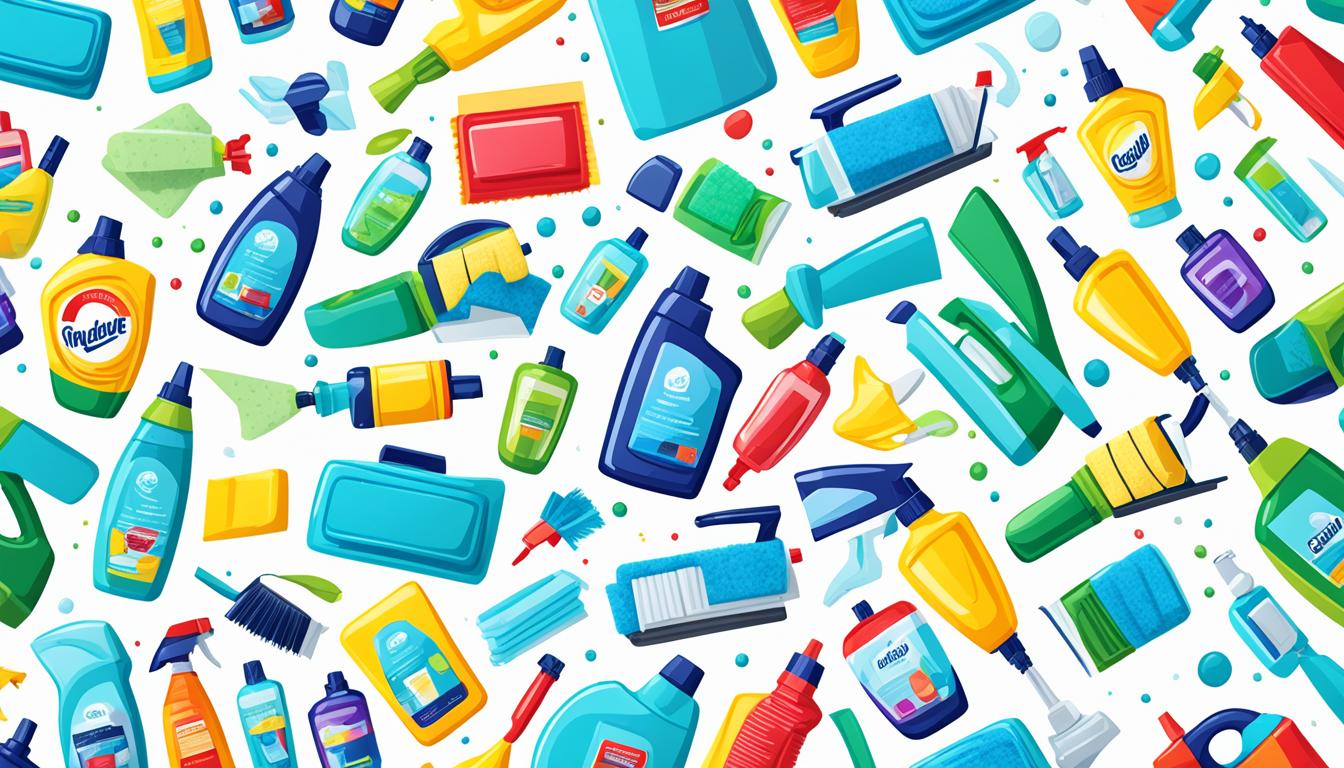Did you know that the cleaning industry is projected to reach a market value of $74.3 billion by 2022? With the demand for cleaning services on the rise, starting a cleaning business can be a lucrative venture.
However, before you jump in, it’s important to understand the licensing requirements for cleaning businesses. While there is no general business license requirement in the state of Texas, there are still important considerations to keep in mind.
Key Takeaways:
- Starting a cleaning business can be a profitable endeavor with the industry projected to reach $74.3 billion by 2022.
- While Texas doesn’t have a general business license requirement, it’s essential to check with local governments for specific license or permit requirements.
- Prioritize worker health and safety, follow advertising guidelines, and establish clear policies and contracts to ensure a successful cleaning business.
- Obtain proper insurance coverage to protect against liability and property damage.
- Understand employment laws and properly classify workers as employees or independent contractors.
Choosing the Business Entity
When starting a cleaning business, one of the crucial decisions you’ll need to make is choosing the right business entity. This choice will determine the level of personal liability protection you have, as well as impact other aspects of your business operations.
As a cleaning business, you operate in other people’s offices or homes, which exposes you to potential risks such as physical activity-related injuries or property damage. To protect yourself and your business, it is advisable to consider forming a separate legal entity, such as a corporation or limited liability company (LLC).
By choosing a business entity that provides personal liability protection, you shield yourself from being personally liable for any accidents or damages that may occur. Instead, the business assumes responsibility for such liabilities, which can be crucial for your financial security.
Operating as a sole proprietorship may seem like an easy option, but it leaves you personally liable for any risks or legal issues that arise. In contrast, by establishing a corporation or LLC, you can help safeguard your personal assets, ensuring they are separate from the business.
Moreover, forming a separate legal entity also enhances your professionalism and credibility in the eyes of clients and partners. It conveys a sense of reliability and commitment to your business and clients’ satisfaction.
While both a corporation and an LLC offer personal liability protection, each has its own benefits and considerations. Consulting with a legal professional or an accountant can help you determine which entity structure best suits your specific needs and goals.

Licenses and Permits
Starting a cleaning business in Texas does not typically require a general business license. However, there are important considerations regarding federal tax ID numbers (EIN), business permits, and local government requirements.
Firstly, obtaining a federal tax ID number, also known as an Employer Identification Number (EIN), is recommended for cleaning businesses. While sole proprietors can operate without an EIN, having one can be beneficial for tax purposes. You can easily obtain an EIN online through the IRS website.
In addition to an EIN, it is essential to research and comply with any local license or permit requirements that may exist at the city or county level. Although Texas doesn’t have a State-specific business license, some cities or counties may impose their own licensing or permitting regulations. Checking with local government offices will help you determine if you need any specific permits for your cleaning business.

Health and Safety
When running a cleaning business, the health and safety of your employees should be a top priority. They may come into contact with cleaning supplies that contain toxic substances, putting them at risk. Additionally, accidents can happen while working in homes or offices. To ensure a safe working environment, it is crucial to be familiar with federal safety and health regulations.
The Occupational Safety & Health Administration (OSHA) provides comprehensive guidelines and resources to help businesses maintain a safe workplace. By following these regulations, you can protect your employees from potential hazards and minimize the risk of accidents. It is recommended to regularly review OSHA’s guidelines to stay updated on best practices for cleaning businesses.
In addition to federal regulations, Texas offers resources and assistance through the Texas Occupational Safety and Health Consultation Program (OSHCON). OSHCON provides free on-site consultations to help businesses identify potential safety hazards and develop effective safety programs. Taking advantage of this program can significantly contribute to the overall safety and well-being of your employees.
Another important aspect of ensuring health and safety in your cleaning business is having appropriate insurance coverage. The Texas Department of Insurance’s Division of Workers’ Compensation (TDI-DWC) provides essential information regarding workers’ compensation insurance, which can protect your employees in the event of work-related injuries. Having the right coverage safeguards both your employees and your business.
Advertising and Contracts
As a cleaning business, effective advertising plays a crucial role in attracting new customers and expanding your client base. To make your advertising efforts successful, it is important to focus on certain key aspects.
First and foremost, ensure that your descriptions of the cleaning services you offer are accurate and detailed. This will help potential customers understand exactly what they can expect when hiring your company. Highlight the unique aspects of your services, such as eco-friendly cleaning products, specialized equipment, or customized cleaning plans.
Another important aspect of advertising is informing customers about any special discounts or promotions you may be offering. Whether it’s a limited-time discount, a referral program, or a discount for bundled services, clearly communicate the details of these offers to entice new customers. This can be done through your website, social media platforms, or even local advertisements.
When it comes to contracts, having well-defined policies and a written plan for your cleaning services is essential. Policy statements provide clarity to customers on various aspects such as cancellation policies, rescheduling procedures, and payment terms. By clearly communicating these policies upfront, you can avoid potential misunderstandings and conflicts.
In addition, consider creating a legal binding contract that outlines the terms and conditions of the agreement between your cleaning business and the client. This contract ensures that both parties are on the same page and have a clear understanding of their responsibilities and obligations. It can cover aspects like service frequency, pricing, liability, and termination conditions.
Remember, contracts are not only beneficial for your business but also protect the interests of your clients. They provide a sense of security and assurance, building trust and confidence in your professionalism and commitment to delivering quality service.
By implementing effective advertising strategies, accurate descriptions, special discounts, and well-defined policies and contracts, you can establish a solid foundation for your cleaning business. These elements contribute to a positive customer experience and help foster long-term business relationships.
Insurance and Employment
Obtaining proper insurance coverage is crucial for your cleaning business to protect against potential risks and liabilities. Whether it’s property damage or employee injuries, having the right insurance can provide you with peace of mind. To ensure you have adequate coverage, it’s recommended to work with an experienced insurance agent who specializes in writing policies for cleaning companies. They can help assess your unique needs and tailor a policy that suits your business.
When it comes to employment, understanding the relevant laws and correctly classifying your workers is essential. This ensures compliance with regulations and helps you avoid potential legal issues. In the cleaning industry, there is often a high employee turnover rate, so having a good understanding of employment laws and the hiring process is crucial. By establishing clear guidelines and following the proper worker classification, you can create a positive work environment that complies with the law.
Additionally, consider bonding as an added layer of protection. Bonding provides financial security to both you and your clients in case of theft or damage during service. It reassures your clients that they can trust your business and provides you with credibility in the industry.
Remember, insurance, proper worker classification, and adherence to employment laws are vital for the success and longevity of your cleaning business. By prioritizing these aspects, you can ensure the safety of your employees, protect against potential liabilities, and maintain compliance with legal regulations.




